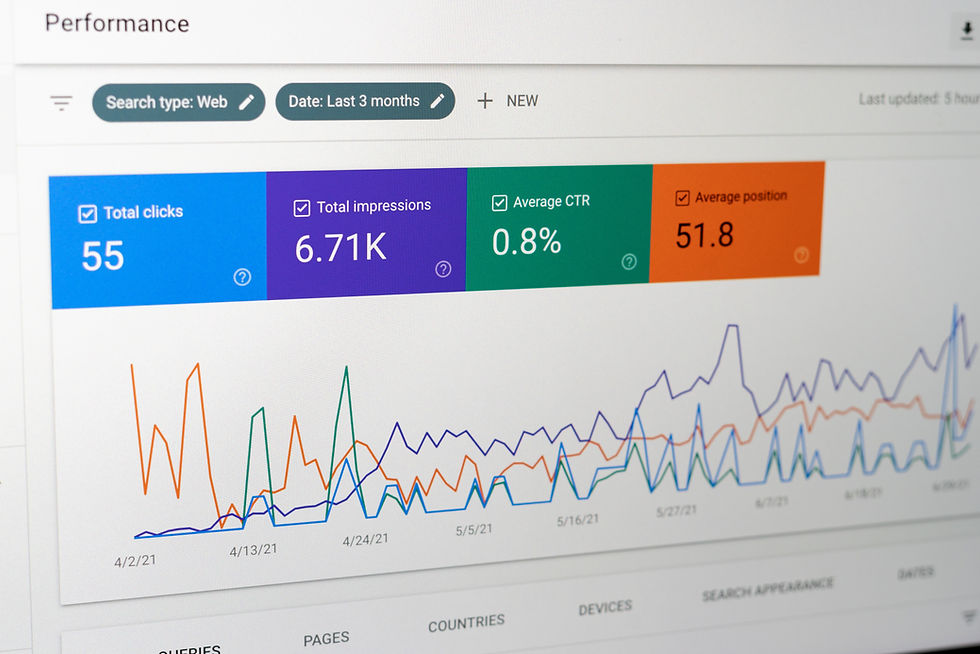How to Prepare for Your Social Media Career
- Reed Knitter

- Mar 6, 2023
- 6 min read
Information in this blog post was obtained from Hootsuite, Social Media Today, and Sprout Social.

Whether you are a young student learning the basics of marketing or currently have a job and are looking for a new opportunity, being prepared for a new job is important. Why? New opportunities present themselves every day in different forms. A position can open up inside the company you work at, or a job might open at your dream company. In fact, Sprout Social recently said that 88% of marketers expect to hire another team member in the next two years. Social media marketers have more opportunities now than ever before, and this is how to get prepared.
Look For Social Media Positions
To prepare for your social media career, you will have to do some research. Luckily, this research doesn't require a 10-page report once you are finished. Looking for positions will help you determine what you are looking for. Hootsuite recommends using social media to search for openings. This can be done by joining social media groups on Facebook, following marketers and companies on Instagram, and especially through connections on LinkedIn. Social media careers offer a wide variety of potential positions, so doing research can help narrow down what interests you the most. Of course, you can also look at regular job posting platforms such as Indeed.

After narrowing down what jobs interest you, take it a step further and set job alerts. To do this, search for a job and toggle the "get job alerts for this search" button. This will notify you of openings for similar positions to that job and can also be linked to locations as well. LinkedIn also offers a function that shows who is hiring in your network. This function, located in the jobs tab, lets you know whenever a first or second-degree connection is hiring. This is a great opportunity to reach out to someone you have connected with to earn a job. If interested in a particular company, most will have a careers tab on their webpage that you can explore to browse positions and opportunities.
By looking through job postings, you can also see what requirements and skills employers are looking for right now. I always say the more you know, the less you don't know. All jokes aside, looking at open positions helps to see what you can spend time learning and working towards. Perhaps a job you come across requires proficient use of Microsoft Office. By knowing this ahead of time, you can learn to use Microsoft Office well and check another requirement off of that list. The next section shows how to learn more skills after narrowing your job search.
Improve Your Skills and Experience
After looking through social media positions, you should have a good idea of what companies are looking for. Most people won't meet qualifications without putting in extra work. Taking a virtual class online is a great way to learn new skills. LinkedIn offers learning courses for digital marketing, sales, social media marketing, and much more. It can't hurt to also read up on a few blog posts. There are many quality marketing organizations that frequently post important marketing topics on their websites.

Another way to showcase skills is through one's social media accounts. Building your presence on multiple platforms shows that you know how to use them and can tell employers more about you. Posting on Facebook about your family trip shows your values. Posting on Twitter about your favorite sports team shows your passion. Posting on LinkedIn about a trend shows you are dedicated to your profession. Always remember that everything you post is on the internet forever, good and bad! Social media can also be used for following thought leaders and companies. This is another great way to keep up with social media marketing.
I also recommend finding a part-time job to gain experience. Most entry-level positions require some experience, and gaining experience sooner rather than later can prove valuable. Reaching out to local businesses or organizations is a great way to get experience without requiring too much time out of your day. You will gain experience in the marketing industry and find out what aspects you like and dislike. A part-time job will give you a better idea of what goes into social media marketing. You may even be able to get internship credit, pay, and potentially a full-time job opportunity. I started working part-time with our college athletics office, where I was able to create a promotion at a basketball game and promote it. I learned what went well and not so well and will be better prepared for any future promotions I may create and work on.
Applying for an internship is another great way to obtain valuable experience. This past summer, I had an internship where I could use skills I learned in my classes and was guided along the way. I made several connections throughout my company and the entire community during my internship. It is always good to keep in touch with those you connect with because the relationships you make through work can give you leads to other job openings and even get your foot in the door with a recommendation or a reference.

Certifications are another great way to prove skills and experience. Many websites offer free courses to gain a certification in specific skills. If there is a skill that you don't have yet or could use as a refresher, try getting certified in it. A social engagement specialist at Hootsuite says, "By educating yourself using free resources, you're showing potential employers that you have taken the steps you needed to take to proactively build your knowledge base." Social media is a rapidly changing industry, and learning more about skills and practices can go a long way. Plus, a certification will look good in any job seeker's biggest asset, their resume.
Building Your Resume
To prepare for a social media career, you will need a strong, creative, and relevant resume. Resumes should be catered to each job that you are going to apply for. A position for a social media job doesn't relate well to the lawn-mowing business you worked for in high school. Try to include the most relevant skills and experiences based on the job description. Going as far as having some of the same keywords will show employers that you read the description thoroughly and will pass through software that sorts through applicants.

Focusing on the results of your jobs can also mean more to employers. When you write about what you did in your past positions, focus on what you accomplished. Instead of writing "created posts on social media," put "increased engagement on Facebook by 150%, Instagram 100%, and Twitter 125% within one year at company XYZ." This will show how you and your work had a specific and quantifiable impact on the company. It is one thing to have experience, but showing success during your time at a company shows much more.
In addition to showing numbers, interested employers may want an example of past work. I recommend keeping a portfolio of all of the best jobs that you have done so there is no scrolling through old posts to find a good example. A good portfolio should include all of your best work. Work to include in a portfolio can be a marketing plan you wrote, a marketing campaign you created, a blog post, and more. You should also have details and statistics about your work. It is hard to remember what kind of results a marketing campaign from years ago received.
To take your resume and portfolio a step further, you can create your own portfolio website. By preparing a portfolio website, you are showing that you are serious about your social media career. Putting the time and effort to showcase yourself online can give employers a chance to learn more about you and your skills outside of a resume. I built my portfolio page on Wix because it is free and easy to use. It would be best to look at portfolio page examples online before creating your website to find inspiration. Once you get a feel for how your own might look, then begin building it. Individualize your page to show your creativity and your best work and experiences to wow every visitor that comes across it. Once completed, your portfolio website is another useful asset to include inside a resume.

While preparing for a career can seem daunting, doing these steps will help boost you in the long run. Searching for jobs, learning new skills, and building your resume can take time. Next time you are bored at home watching Netflix or playing video games, try to work on one of these. It's always better to be more prepared than less.
Want to learn more about how to get your dream job in marketing? Read Kaitlyn Glass's post Where, Oh Where, is My Marketing Job? as she digs further into looking for marketing jobs and how to win the position. Make sure to keep following The SMMU for more great social media marketing knowledge.
Resources
Gomez, R. (2022, August 11). Social Media Careers: The skills you need, where to look and jobs to consider. Sprout Social. Retrieved February 21, 2023, from https://sproutsocial.com/insights/social-media-careers/
Hirose, A. (2023, February 6). How to get a job in social media: 6 expert tips for 2023. Social Media Marketing & Management Dashboard. Retrieved February 21, 2023, from https://blog.hootsuite.com/how-to-get-a-job-in-social-media/
Hutchinson, A. (2022, September 1). LinkedIn shares new data on the most in-demand skills, new notifications of opportunities in your network. Social Media Today. Retrieved February 21, 2023, from https://www.socialmediatoday.com/news/linkedin-shares-new-data-on-the-most-in-demand-skills-new-notifications-of/630978/




Comments